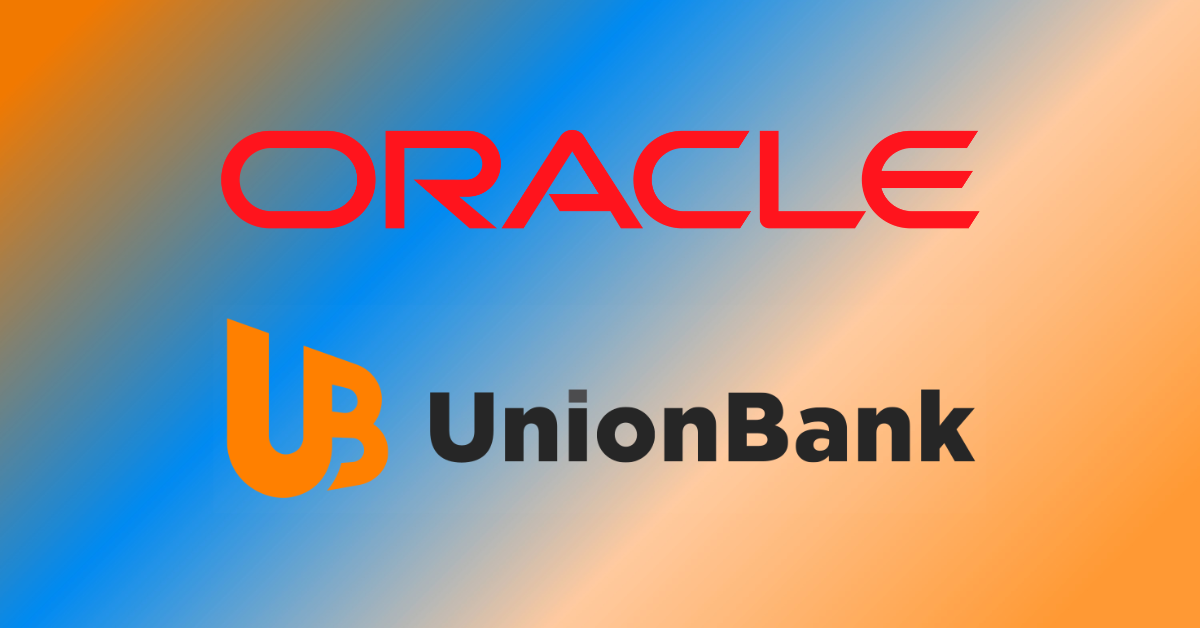Many organizations will admit that the ongoing pandemic put their business transformation in an accelerated mode, but this is not the case for one of the country’s top banks: Union Bank of the Philippines (UBP).
I had the opportunity of sitting down with Dennis Omila, Chief Information Officer of Union Bank of the Philippines to know how his organization overcame the pain points of implementing digitalization and how Oracle has helped them through their digital transformation journey. Built on a very solid foundation, the strategic partnership of UnionBank and Oracle goes a long, long way according to Omila — something that started even before he joined the bank.
“During the time when more than 70% of Filipinos were still unbanked and underserved, our Chairman, President, and CEO talked to me and told me that we really need to serve the farmers, teachers, drivers, etc. These people used to rely on loan sharks using their future income as their collateral, and they will end up just working to pay their creditors. We think that with technology, we can lower the cost to get to them and understand to who we can provide financial services,” according to Omila when I asked him the story behind UBP’s digital transformation journey.
Aside from one of the bank’s goals being to make a difference in the lives of Filipinos, UBP also believed in the saying “digitize or perish” — effectively making them one of the digital banking pioneers in the country. Redefining the customer experience and adding value to its customers served as the “soul” of the bank’s digital transformation, and they found a partner in Oracle to deliver these changes.

“As we accelerate, we came up with this moonshot to reach more Filipinos for financial inclusion, we knew that scale is going to be needed. Previously, they (Oracle) were only supplying the database licenses to us, to now (as strategic partners), they give us the right resources to plan after understanding what we wanted to achieve. From the typical ‘just license delivery’ to ‘thinking together’ on how to achieve our goals,” said Omila when I asked him how he would describe their relationship with Oracle.
A huge part of the bank’s processes (more than 50%), particularly their Tier 1 systems (customer-facing, mission-critical, and revenue-generating services) including its AMLA (Anti-Money Laundering) system rely on Oracle. The fact that Oracle has one of the most robust (if not the most robust) database solution platforms available today made UBP decide to stay and grow with them among the number of available options.
“We transformed our branches, we did cash-out services so that people can bank anywhere without the need to go to our branches, we exposed our API platform — all of those we don’t need to worry about how many licenses, etc. Oracle simply gave us the speed and allowed us to see them more as a partner in our transformation,” added Omila sharing that as they move to the cloud, Oracle has always been part of their plan.
Omila also mentioned that aside from proper training received from Oracle, the bank also enjoys some sort of a cost-avoidance report allowing them, as a client, to extract more value and savings from the products and services that they subscribed to.
“Normally, the vendors will go to you to generate more revenues for themselves. It is very rare that someone goes to you and says, ‘use these and you don’t have to pay anything more to extract more value.’ It just shows the transformation and difference that we began to see from Oracle.”
Among the challenges faced by UBP during their digital transformation is “virality,” which led to unexpected growth. For example, when the bank introduced its mobile check (cheque) deposit that allowed their clients to deposit their cheques by simply taking a photo of it using the UBP app — people started posting on their social media accounts eventually making people open an account, which can also be done without actually visiting a physical UBP branch. Being a good challenge to take, the bank is currently in the process of moving to the cloud with more than 500 virtual machines up to have that auto-scaling capability.
Omila added that the secret to the success of UBP’s digital transformation is not just the technology that they used, but the people who were part of the cultural transformation.
“Whatever technology we buy, the other banks can buy it (and maybe they can even buy more). The people, the culture, the way we work, and the way we think are the secret for us to be able to transform. The real competition is about the customer experience and the value that you are able to provide — customer obsession. Also, what is important to us now is the partnership (with Oracle). They know what we are trying to do, what’s keeping us awake at night, and what we stand for. We have a common purpose,” Omila said in closing.
Aside from being the bank’s CIO, Omila also holds the position of Executive Vice-President and Operations Officer of Union Bank of the Philippines. He also sits as a Board Director of UBX Philippines (UBP’s fintech spin-off) and is the Executive Advisor of the Digital Integration Committee – the Technical Governance and Oversight committee for all of UBP’s subsidiaries. Before joining UBP, he was the Senior Vice President of Infrastructure Engineering and Service Operations of Globe Telecom, Inc. In 2020, Omila was awarded one of the Top 10 of the Top 50 Tech Leaders in Southeast Asia by the CIO of the International Data Group (IDG).


